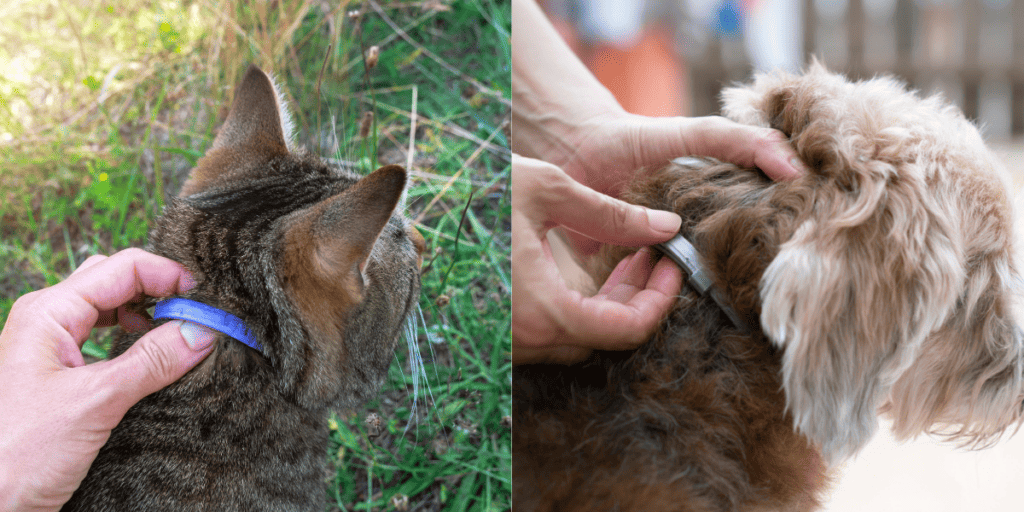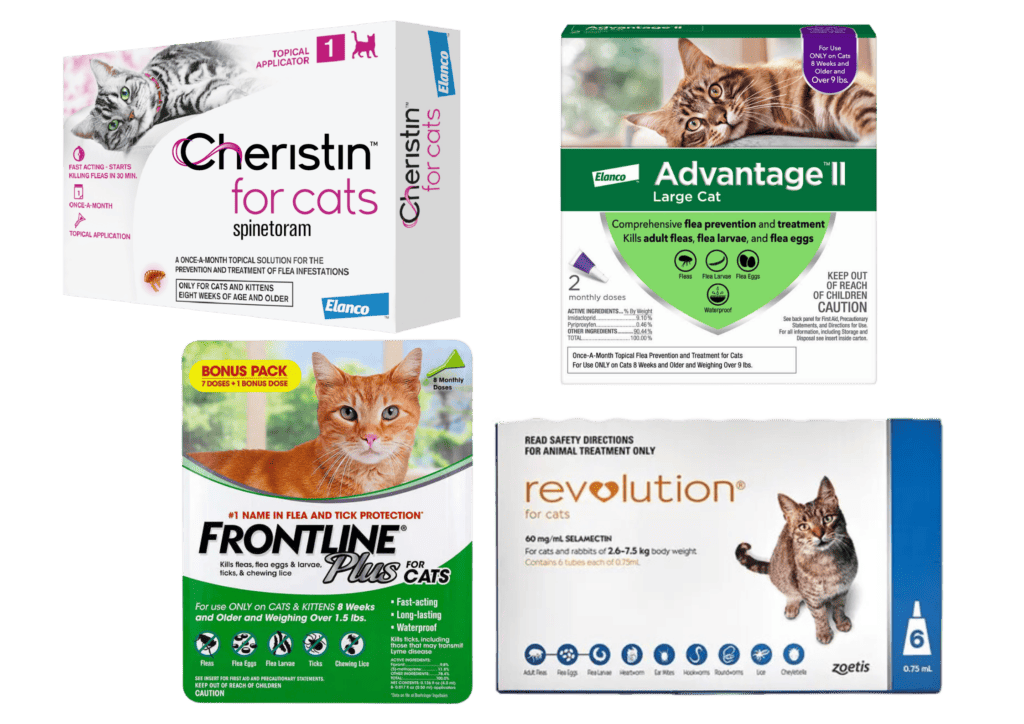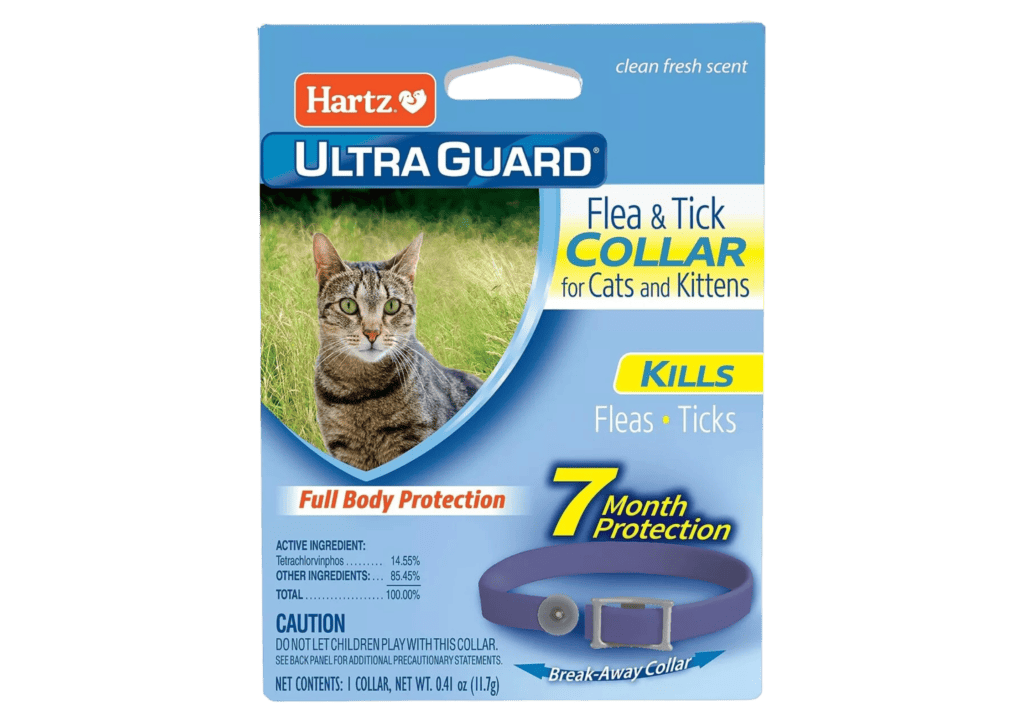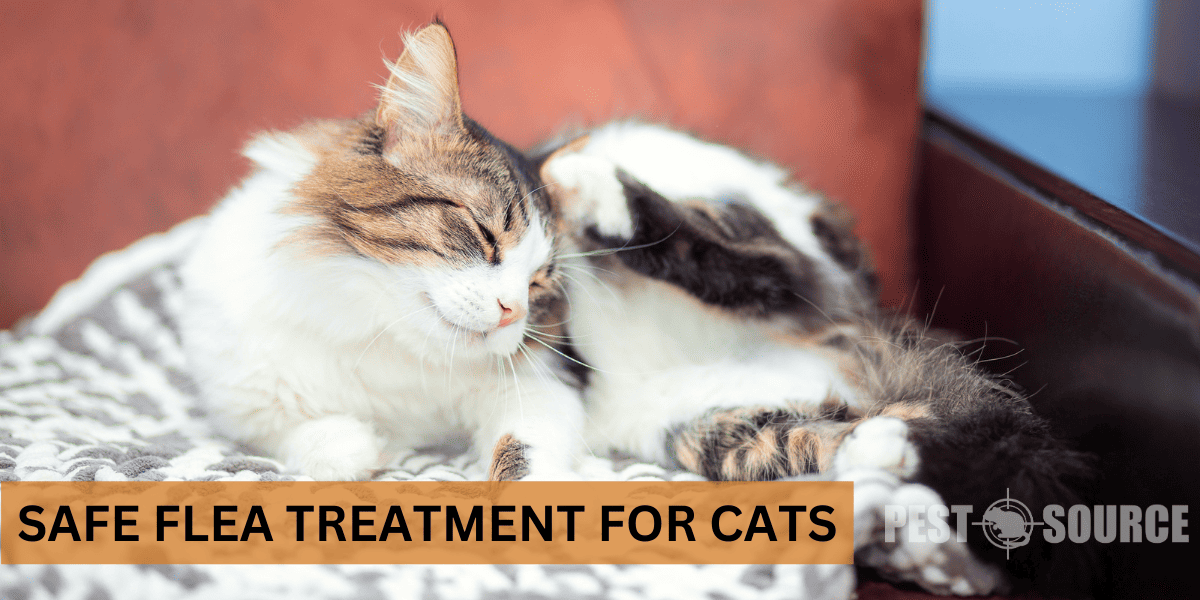Ensuring the wellbeing and comfort of your feline friend extends beyond regular feeding and affection, it requires keeping them free from pesky parasites like fleas. These parasites not only cause discomfort but may also lead to more severe health issues. Therefore, choosing the safest flea treatment for cats is a critical responsibility for every cat owner.
This article will delve into understanding what constitutes a safe flea treatment, comparing various treatment methods such as collars, topicals, and oral medications. It will evaluate specific brands and products, consider special treatment for different cat groups, and examine the safety and effectiveness of flea collars. Furthermore, we will discuss effective flea prevention strategies and home solutions for flea control, and conclude with vet-recommended flea treatments and practical tips for choosing the safest options.
POINTS
- Safe flea treatments for cats are crucial to protect your pet from discomfort and potential health risks associated with flea infestations. Choosing the right treatment depends on your cat’s individual needs and sensitivities.
- Flea treatment options for cats include topical applications, flea collars, oral medications, and flea powders. Each method has its benefits and drawbacks, and a consultation with your veterinarian is essential before selecting a treatment.
- Safest flea treatments for specific cat groups, like kittens and older cats, require age-appropriate or gentle formulations. Consulting with your veterinarian to determine suitable treatments for these groups is crucial.
- Several flea treatment brands, such as Advantage, Cheristin, Frontline, Revolution, and Seresto, are considered safe and effective. However, a veterinarian’s guidance is essential to determine the most suitable treatment for your cat.
- Prevention methods involve regular application of flea treatments, maintaining a clean environment for your cat, and monitoring them for early signs of flea infestation. Always follow veterinary guidelines when applying flea treatments and consult your veterinarian for the best prevention methods.
Evaluating the Safety of Different Flea Treatments for Cats
Why is safe flea treatment necessary for cats?

Safe flea treatments are essential for cats because they help protect your pet from the discomfort and potential health risks associated with flea infestations. Fleas can cause irritation, itching, and skin infections, and in severe cases, they can lead to anemia or the transmission of diseases. Using a safe and effective flea treatment not only improves your cat’s quality of life, it also prevents the spread of fleas to other pets or humans in your household.
Overview of flea treatments available for cats
When selecting a flea treatment for your cat, it’s important to weigh the benefits and drawbacks of each type available. Below is a table that provides a quick overview of the main types of flea treatments, including topical applications, flea collars, oral medications, and flea powders, to help you make an informed decision.
| Treatment Type | Advantages | Disadvantages |
|---|---|---|
| Topical Applications | Direct skin application, long-lasting protection | Can be messy, requires drying time |
| Flea Collars | Easy to use, continuous protection | Potential for skin irritation, effectiveness varies |
| Oral Medications | Fast-acting, not affected by bathing | Requires dosing, possible side effects |
| Flea Powders | Can be used on pet and in environment | Short-term solution, inhalation risk for pets/humans |
Understanding Flea Treatments: Risks and Benefits
What Constitutes Safe Flea Treatment for Cats?
A safe flea treatment for cats is one that effectively eliminates existing flea infestations while minimizing the risk of any side effects or harm to your pet. Factors to consider when evaluating the safety of a flea treatment include:
- The ingredients used and their potential for causing allergic reactions or adverse side effects
- The method of application and its impact on the cat’s stress levels
- Any potential risks or dangers to other pets or humans in the home
When searching for a safe flea treatment, it’s crucial to consult with your veterinarian to ensure that the product is suitable for your cat’s age, weight, and health condition.
Can Flea Medicine Kill a Cat: What Are the Risks Involved?

Though rare, flea medicine can pose lethal risks to cats if used improperly. Overdosing, using dog-specific treatments on cats, or utilizing a product with an ingredient your cat is sensitive to can all result in harmful consequences. Symptoms of an adverse reaction to flea medication can include vomiting, seizures, drooling, or difficulty walking. If your cat exhibits any of these symptoms after receiving a flea treatment, immediately consult your veterinarian.
How Does a Flea Treatment Work?
Flea treatments typically work either by killing adult fleas, inhibiting their ability to reproduce, or both.
- Topical Solutions: These are meticulously formulated to be absorbed into a cat’s circulatory system. Once an adult flea bites the treated cat, the ingested compound swiftly acts to eliminate the parasite.
- Flea Collars: Ingeniously designed, flea collars gradually emit a specific set of chemicals that create an inhospitable environment for flea eggs to mature, effectively halting the next generation in its tracks.
- Oral Medications: These are ingested by the pet and work systemically to interrupt the flea’s life cycle from within. They attack fleas at different stages of development, ensuring that the infestation is tackled comprehensively and preventing future outbreaks.
Does Flea Resistance Exist: The Case of Advantage
Flea resistance to treatments occurs when fleas become less susceptible to a particular insecticide over time. In the case of Advantage, there have been reports of fleas developing a resistance to the active ingredient imidacloprid, rendering the treatment less effective. It is essential to consult with your veterinarian if you suspect that your cat’s flea treatment is no longer effective, as they will be able to recommend alternative options to manage the infestation.
Comparing Flea Treatments: Collars, Topicals, and Oral Medications
What’s the Difference between Flea Collars and Topical Drops?
When considering flea treatment options for your cat, it’s essential to understand the differences between flea collars and topical drops. Each has its own set of benefits and drawbacks, making them suitable for various situations and preferences. Here’s a quick comparison to help guide your decision:
Flea Collars

- Worn around the cat’s neck, releasing chemicals that repel or kill fleas.
- Provide ongoing protection and distribute chemicals across the cat’s skin and fur.
Topical Drops

- Applied directly to the cat’s skin, usually between the shoulder blades or at the base of the neck.
- Absorbed by the cat’s skin, working systemically to kill fleas that bite the cat, and offer long-lasting protection against fleas.
What is Better: Flea Collar or Drops for Cats?
The decision between using a flea collar or drops for your cat depends on your cat’s individual needs and preferences, as well as your own priorities. Flea collars can be more cost-effective but may not provide the same level of protection as topical drops. Additionally, some cats may be sensitive or allergic to the ingredients in flea collars, making them an unsuitable option. Topical drops tend to be more potent in terms of flea control, but they may be more challenging to apply for cats that resist handling.
Is Flea Powder a Safe Alternative for Cats?

Flea powders can be a safe alternative for cats, provided they are formulated specifically for felines and do not contain toxic ingredients. However, they may not be as effective as other treatment methods in eradicating fleas, as they primarily target the adult fleas living on the cat’s fur. It’s also important to avoid inhaling the powder, both for you and your cat, to prevent respiratory irritation.
What’s the Role of Oral Flea Treatments in Feline Flea Management?

Oral flea treatments offer a convenient alternative to topical applications and flea collars. These medications work systemically, killing adult fleas when they bite the cat. One advantage of oral treatments is that, unlike collars or topicals, they cannot be rubbed off or washed away. Additionally, oral medications may work faster in combating infestations.
Are Oral Flea Medications Safe and Effective for Cats?
Oral flea medications can be safe and effective for cats when administered correctly and according to the manufacturer’s instructions. Some of the most popular oral flea medications for cats include Comfortis, Capstar, and Bravecto. However, there are potential side effects associated with oral medications, such as vomiting, diarrhea, or lack of appetite. Always consult your veterinarian before introducing a new flea medication to ensure it is suitable for your cat’s age, weight, and health status.
Exploring Specific Flea Treatment Brands and Products
What are the Best and Safest Flea Treatment Brands for Cats?
Selecting the right flea treatment brand is crucial for ensuring the safety and comfort of your feline friend. Among the numerous options available, certain brands stand out for their effectiveness and safety profile. Here’s an overview of some of the best and safest flea treatment brands for cats:
| Brand | Active Ingredient | Effectiveness | Suitable For | Key Features |
|---|---|---|---|---|
| Advantage | Imidacloprid | Fast-acting, long-lasting | Cats of all ages | Budget-friendly, reliable |
| Cheristin | Spinetoram | Begins killing fleas within 30 mins | Specifically for cats | Fast-acting, monthly protection |
| Frontline | Fipronil, (S)-methoprene | Kills fleas and ticks | Cats and kittens over 8 weeks | Long-lasting, also targets ticks |
| Revolution | Selamectin | Broad-spectrum coverage | Cats of all ages, including pregnant and nursing cats | Protects against fleas, ticks, heartworm, and more |
| Seresto | Imidacloprid, Flumethrin | Up to 8 months of protection | Cats and kittens 10 weeks of age and older | Non-greasy, odorless, water-resistant |
Cheristin vs Frontline vs Revolution vs Advantage: Which is Safer and More Effective?

Each of these treatments has its advantages, but their safety and effectiveness ultimately depend on your cat’s individual needs and sensitivities. Cheristin is a fast-acting topical treatment, while Advantage is a reliable and budget-friendly option. Frontline Plus offers protection against both fleas and ticks, and Revolution provides broad-spectrum coverage against fleas, ticks, heartworms, and other parasites. Consult your veterinarian to determine the best treatment option for your cat.
Is Cheristin FDA Approved and What is Its Active Ingredient?
Cheristin is FDA-approved for use in cats and contains the active ingredient spinetoram, which effectively targets adult fleas. Spinetoram is classified in the same family as other insecticides, such as imidacloprid and fipronil, but has a distinct mode of action in controlling fleas. Cheristin is fast-acting, with the ability to begin killing fleas within 30 minutes of application and provide month-long protection.
What Flea Treatments Do Vets Use for Cats: Is it Advantage II or Hartz?

Vets may use a variety of flea treatment options, depending on factors such as individual cat needs and local flea resistance patterns. Advantage II, as well as Frontline Plus and Revolution, are more popular among veterinarians than Hartz products. These treatments typically have a higher success rate and are backed by more extensive research.
What’s the Best Non-Prescription Flea Treatment for Cats?
While prescription flea treatments often provide the most effective and comprehensive protection, pet owners may still find success with non-prescription options. Products like Advantage II, Frontline Plus, and Seresto flea collars are frequently recommended non-prescription choices. However, always consult your veterinarian before using a non-prescription flea treatment to ensure it is suitable for your cat’s specific needs.
Special Considerations in Flea Treatment for Different Cat Groups
What is the Safest Flea Treatment for Kittens?

When treating kittens for fleas, it’s essential to select a treatment that is specifically formulated for young cats. Flea treatments for adult cats may contain ingredients that are too potent for kittens and can cause adverse reactions. Most flea treatment manufacturers offer kitten-specific or age-appropriate options. Some examples include Advantage II for Kittens and Frontline Plus for Kittens. Always consult your veterinarian for the most suitable and safest flea treatment for kittens.
Are There Special Flea Treatments for Older Cats?

Older cats may be more prone to health issues and have weaker immune systems, making them susceptible to the side effects of flea treatments. Therefore, it’s vital to use a flea treatment designed specifically for senior cats or one with a gentle formulation. Consult with your veterinarian to determine the best flea treatment for your older cat, taking into consideration your cat’s age, overall health, and specific sensitivities.
Can Flea Collars Make Cats Sick: Are They Safe for Kittens and Older Cats?
Flea collars can sometimes cause adverse reactions or skin irritation in cats, particularly in young and older cats with more sensitive skin. Some flea collars may contain harsh chemicals that can cause health issues if ingested or inhaled. It is crucial to read product labels and choose flea collars with kitten- or senior-appropriate formulations to minimize the risk of adverse reactions. If you notice any signs of discomfort, swelling, or irritation around the collar area, consult your veterinarian immediately.
Reviewing Safety and Effectiveness of Flea Collars
What’s the Safest Flea Collar for Cats: A Comparison of the Best Options
Several flea collars offer effective protection while being gentle on your cat’s skin. Some of the safest options include the Seresto Flea and Tick Collar and the Hartz UltraGuard Flea and Tick Collar. These collars use sustained-release technology to provide long-lasting protection against fleas and ticks without causing irritation or harm to your cat. Nevertheless, it is essential to monitor your cat’s reaction to a flea collar and consult your veterinarian if any adverse effects are noticed.

Are Cat Flea Collars Safe and Effective: Weighing the Pros and Cons
When considering flea collars for your cat, it’s crucial to balance the benefits against the potential drawbacks. Here are the key points:
Pros of Flea Collars:
- Long-lasting protection against fleas.
- Cost-effectiveness makes them an economical choice.
- Ease of use for pet owners
Cons of Flea Collars:
- Potential for adverse reactions in some cats.
- Can cause irritation or discomfort.
- May offer less comprehensive protection than other treatment methods.
It’s important to consult with your veterinarian to decide if a flea collar is the right choice for your cat, taking into account its specific needs and sensitivities.
Flea Collar vs Flea Drops: Which is Better?
The choice between flea collars and flea drops depends on several factors, such as the cat’s preferences, sensitivities, lifestyle, and owner’s priorities. Flea collars may provide longer-lasting protection and are more cost-effective, but they may not be suitable for all cats due to skin sensitivities or allergy concerns.
Conversely, flea drops can offer more comprehensive and potent protection against fleas, but they can be more challenging to apply, especially for cats that resist handling. Consult your veterinarian to discuss the best option for your cat.
Exploring Non-Topical Flea Treatments for Cats
What are the benefits and drawbacks of oral flea treatments for cats?
Benefits of oral flea treatments include their ease of administration, rapid action against flea infestations, and their unaffected status by water exposure. Drawbacks can consist of potential side effects such as vomiting, diarrhea, or loss of appetite, as well as the need for consistent re-administration to maintain flea protection.
What are the best non-prescription and non-toxic flea treatments for cats?
Choosing a non-toxic, non-prescription flea treatment for your cat can be a gentle way to manage minor flea infestations while avoiding harsh chemicals. Below is a table of natural flea remedy options that are considered safer for your cat, though it’s always best to consult with your veterinarian before starting any new treatment.
| Natural Remedy | Description | Considerations |
|---|---|---|
| Diatomaceous Earth | A powder that dehydrates fleas on contact | Use food-grade, and apply cautiously to avoid inhalation |
| Apple Cider Vinegar | A natural repellent when added to cat’s water | Not a flea killer, but can deter fleas |
| Herbal Flea Repellents | Sprays or powders made from natural herbs | Choose cat-safe herbs and apply as directed |
Remember, while these options are safer and less toxic, their effectiveness can vary. Always prioritize your cat’s health and comfort by seeking professional advice.
How safe and effective is Hartz for cats, particularly Hartz flea collar?

Hartz flea collars may be a suitable option for some cats, but they may not be as effective as other flea treatments. Always monitor your cat for any signs of discomfort or irritation when using a Hartz collar, and consult your veterinarian if you notice any adverse effects.
Evaluating Safe Home Flea Treatments for Cats
What are safe cat flea treatments for the house?
Keeping your home flea-free is crucial for your cat’s comfort and health, and choosing the right treatment is key. Here’s a table of safe flea treatment options for your home, highlighting both non-toxic sprays and non-chemical alternatives to ensure the safety of pets and humans alike.
| Treatment Option | Type | Key Features |
|---|---|---|
| Non-toxic Flea Sprays | Chemical | Formulated to be safe for both pets and humans |
| Diatomaceous Earth | Non-chemical | A natural powder that dehydrates fleas on contact |
| Flea Traps | Non-chemical | Use heat and light to attract and trap fleas |
Always follow the manufacturer’s instructions closely when using these treatments to maximize effectiveness and ensure the safety of all household members.
What flea sprays are safe for cats?

Flea sprays specifically formulated for use around pets, such as Vet’s Best Flea and Tick Home Spray or Adams Flea and Tick Home Spray, are considered safe for cats. However, always ensure proper ventilation and follow the manufacturer’s guidelines to minimize any risk to your pet or other household members.
What precautions should one take while using flea killers at home?
When using flea treatments in your home, take the following precautions:
- Read the product label carefully and follow all safety instructions
- Keep your cat away from treated areas until the treatment has dried or the advised waiting period has passed
- Ensure proper ventilation during and after treatment
- Store flea treatment products in a secure location, away from children and pets
- Dispose of used flea treatment products according to the manufacturer’s guidelines and local regulations
Expert and Veterinary Opinions on Flea Treatment
What flea treatments do vets use for cats?
Vets often use flea treatments such as Advantage, Frontline, Revolution, and Cheristin, as these products are backed by extensive research and offer a proven history of effectiveness. However, your veterinarian will recommend the best treatment for your cat based on factors such as age, weight, health status, and local flea resistance patterns.
What are the best vet-recommended flea treatments and prevention methods?

Vet-recommended flea treatments include prescription and over-the-counter options like Advantage, Frontline, Revolution, Seresto flea collars, and oral medications such as Comfortis or Bravecto. Prevention methods involve regular application of flea treatments, maintaining a clean environment for your cat, and monitoring your cat for early signs of flea infestation.
What are the considerations for defleaing kittens as per veterinary guidelines?
When defleaing kittens, veterinary guidelines suggest using kitten-specific or gentle flea treatments, consulting with a veterinarian before applying any flea treatment, and adhering to the specified age and weight requirements listed on the product label.
Concluding Thoughts on Safe Flea Treatment for Cats
Recap of the safest flea treatments for cats and the factors to consider
The safest flea treatments for cats depend on factors such as age, weight, individual sensitivities, and overall health. Topical treatments, flea collars, and oral medications all have their advantages, but always consult your veterinarian to determine the best option for your cat.
The importance of professional advice in choosing a flea treatment for cats
Professional advice from your veterinarian is essential in choosing a safe and effective flea treatment for your cat, as they can provide tailored recommendations based on your cat’s age, weight, and health condition. Additionally, they can identify any potential sensitivities or allergies to particular ingredients and guide you in selecting the most appropriate treatment to ensure the well-being of your beloved pet.



